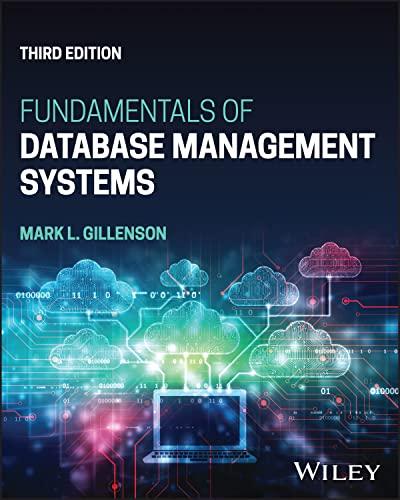Answered step by step
Verified Expert Solution
Question
1 Approved Answer
On a CPU that executes 1 0 9 operations per second, algorithm A took 0 . 1 seconds to run on an input of size
On a CPU that executes operations per second, algorithm A took seconds to run on an input
of size
and seconds to run on an input of size On a CPU that executes operations per second, algorithm A took seconds to run on an input
of size and seconds to run on an input of size What is the asymptotic running time of
algorithm
You are tasked with solving a problem on a list with elements. There are three algorithms
and available, with the following running times: and
Which algorithm will be the fastest on your input?
A Algorithm
B Algorithms and
C Algorithms and
D Algorithm
E Algorithm
What is the asymptotic running time of the following algorithm in terms of elementary operations?
Count only operations on line
A
B
C
D
E What is the number of comparisons of the following algorithm in the AVERAGE case? Count only
comparisons involving an element of those in line You may assume that each element of is
either or chosen uniformly that is with probability
A
B
C
D
E
What is the asymptotic relation between functions and Assume that represents an
angle in degrees.
A There is no asymptotic relation
B is and is
C is
D is
E is
Consider three functions and such that and Which of
the following statements is the most accurate?
A is not asymptotically related to
B is and not
C is
D is and not
E is What is the most accurate expression for the running time of the following algorithm in terms of
elementary operations? Count assignments, comparisons, and arithmetic operations. a and are lists
of integers.
You evaluate a sorting algorithm by measuring its running time on a few inputs of increasing sizes
and the results show that, on these particular inputs, the runtime was Which algorithm is
NOT consistent with your observations?
A Mergesort
B Insertion sort
C None they are all consistent
D Selection sort
E Quicksort
You evaluate a sorting algorithm by measuring its running time on a few inputs of increasing sizes and
the results show that, on these particular inputs, the runtime was Which algorithm is consistent
with your observations? You evaluate a sorting algorithm by measuring its running time on a few inputs of increasing sizes
and the results show that, on these particular inputs, the runtime was Which algorithm is NOT
consistent with your observations?
A Selection sort
B None they are all consistent
C Insertion sort
D Quicksort
E Mergesort

Step by Step Solution
There are 3 Steps involved in it
Step: 1

Get Instant Access to Expert-Tailored Solutions
See step-by-step solutions with expert insights and AI powered tools for academic success
Step: 2

Step: 3

Ace Your Homework with AI
Get the answers you need in no time with our AI-driven, step-by-step assistance
Get Started


